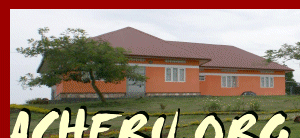|
|
| Circular -
September 2017 |
| I've been reading the latest reports from Acheru. There are different strands to the work with inpatients, outpatients, rural clinics, community based rehabilitation, and the work at Minakulu in the north. It will soon be time for us to review the finances in the hope that we can renew our guarantee of providing their budget for at least the next three years. We pay a fixed budget for Acheru and are cautious about increasing it. Inevitably the reports highlight things for which they would like more money, and they have to face rising costs there, but we've realities to face here too and we don't want to risk the work by promising money we can't afford. |
| I don't want to give the impression that the work is suffering due to lack of funding. We believe the allocated budget is realistic, but inevitably difficult decisions have to be made on how money is spent. If I thought there was an emergency I would do my utmost to find whatever help was needed, but what we're dealing with are just the day to day demands of a wide ranging work, where choices have to be made. For example, the latest report on Community Based Rehabilitation comments on the usefulness of the workshop at Acheru for making appliances for disabled children, but they struggle to find money from the budget to buy the materials they need - wood, sponge, leather etc. I've also been reading the report on work in the north at Minakulu. The number of patients is relatively small, but each is an individual for whom treatment can mean big changes, and I don't want to see them lose that opportunity. While we are considering the budget here I will also be asking the Acheru staff and board to evaluate all aspects of the work. We don't want any child to be denied treatment and it's a good time to look again at which Acheru services meet the greatest need, and what would happen to our patients if we weren't there. |
| I'll be going into all this with the Acheru board before we make any far reaching financial decisions. The extent of the work already done reflects the generosity of our donors, and we remain positive about the future, but we must continue to exercise effective stewardship of the money we're given while also trying to ensure that we don't unnecessarily restrict the work. |
| As well as reading reports and statistics which give an overview of what's being done, and how it can stretch resources, I've also been looking at some of the reports on individual children, which helps to put it all in context. One 16 year old girl, Achieng Grace, was in constant pain following an elbow injury ten years ago. Compared with many other patients, surgery and rehabilitation were straightforward, but what a difference for the girl, with arm movement restored and freedom from pain. |
| Nyarwa Magdalena, another 16 year old girl, was encountered through the community programme, had deformed feet from birth. This should have been relatively easily treated when she was a baby, but there followed a catalogue of painful misplaced interventions, abuse and beatings because of her condition, a despairing mother who couldn't see a future for her daughter. Now she has been treated at Acheru and it's our hope that when she is seen in her community other children will be brought forward, with earlier intervention avoiding a lot of suffering. |
| Individuals like these need to be considered in assigning a budget. There's a human impact to the decisions we make and as well as looking at the sums of money we spend, I sometimes divide the total by the number of children treated. What at first seemed a large sum of money looks very different when it's related to the cost of treating each individual child. |
| Pray for wisdom for us as we review finances, and consider what level of support we should commit to. Pray too for the Acheru board as they must face the realities of their situation in evaluating the work, planning for the future, looking at alternatives, and making choices. |
Brian Dorman |
|
|
|



